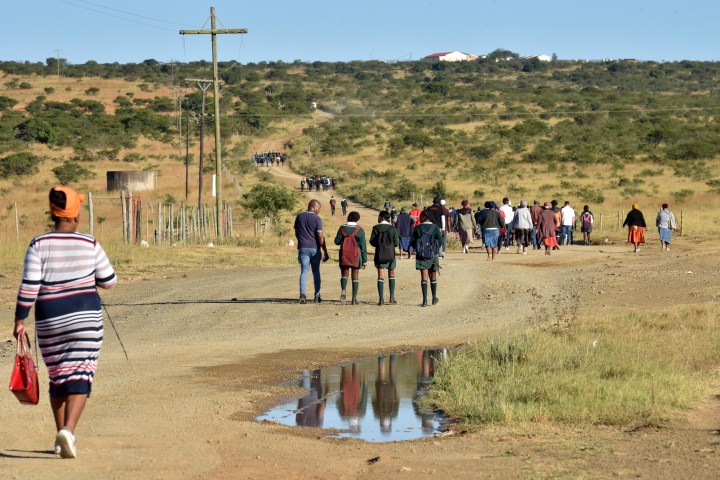
Members of the South African Human Rights Commission walk to school with pupils who do not have access to scholar transport, on 6 March 2024. The walk started in Mbizana village, near Middledrift in the Eastern Cape, and took them to Ntabenkonyana Secondary School, nearly 10km away. (Photo: Deon Ferreira)
A Grade 9 girl from a rural village in the Wild Coast region has joined forces with others to support a legal application to compel the Eastern Cape transport department to provide them with scholar transport. The girls, known as Lulamile, describe their daily struggles, including missing school morning prayers and the first class of the day, and the long journey back home. They also want the education department to provide a catch-up plan for pupils who have been adversely affected by walking long distances to school.
Lulamile is one of thousands of pupils who are not given scholar transport in the Eastern Cape due to funding constraints in the controversial programme. It was only this year, after warnings by the Auditor-General and other watchdog bodies, that the transport department introduced a digital program to implement better cost control, but scholar transport remains underfunded.
Since January, the province's politicians have refused to allow two crucial debates on the topic. In the Nelson Mandela Bay metro, a motion asking for political intervention in the plight of hundreds of children in peri-urban areas who have been left without scholar transport was not allowed. It was dismissed as "politicking" and the ANC councillors indicated that the provincial government was dealing with the issue.
In February, another motion brought by DA member of the provincial legislature Marshall von Buchenroder was shut down even though it had been agreed that it would be heard. The legislature’s sittings in Bhisho are normally livestreamed, but this one was not. The leader of the opposition, Bobby Stevenson, who has since retired, took up the issue with the Speaker’s office in a letter.
Stevenson said it was an “unconstitutional act” not to livestream the debate on scholar transport. He believed it was important that maturity and reasonableness be shown on all sides of the House to preserve the dignity of the institution. Von Buchenroder later said the DA members still did not know why the debate had been shut down.
The Legal Resources Centre's application will be heard in the High Court in Makhanda on 2 May. The girls' story highlights the hardships faced by students who must walk long distances to school and back home every day, while politicians refuse to talk about it.

